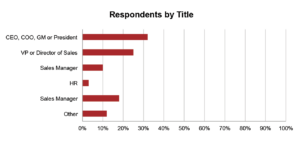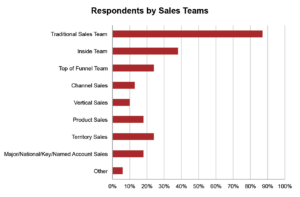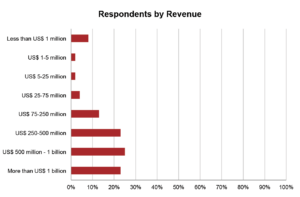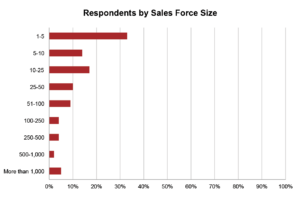
The Modern Science Behind Sales Force Excellence provides insights, commentary and conclusions reached from our Sales Force Effectiveness Study, conducted during the latter part of 2014.
We will report on the practices of companies large and small, with and without dedicated top of the funnel teams, and with and without traditional sales forces. The study was designed to be inclusive rather than exclusive, and have applicability to any sales leader, HR professional or senior executive that reviews it.
We have differentiated this report from other studies by:
- Including companies ranging in revenue, from under $1 million to more then $1 billion
- Including companies with sales forces ranging from fewer than 6 to more than 1,000
- Including companies from more than 200 industries
- Including companies with sales teams selling into channels, territories, major accounts and verticals, as well as teams dedicated to inbound, social and traditional
- Going beyond the answers, thinking like sales freaks and telling the real story behind the data
This report shows the impact of initiatives like Social Selling, but not only from companies that have dedicated teams for social selling. The report also shows the impact of sales training, but not just on large companies and traditional sales forces. The report shows the impact of Inbound marketing, but not only from companies that traditionally make up the inside sales industry. And the report shows the impact of improved sales processes, recruiting processes and related tools.
Rather than take a linear journey through the questions we asked and the answers we received, we will focus on those companies that achieved the best and worst results, and identify the driving forces behind both outcomes. Finally, we end the report with our conclusions of best practices need to replicate the results of the companies who are reporting the greatest sales effectiveness.
Does Sales Process Have An Impact On Sales Effectiveness?
As you can see from the graph below, nearly 70% of the respondents claimed to have a customized, formal, optimized sales process.

We use the word “claimed” because this particular result was quite surprising to all of us. When Objective Management Group (OMG) evaluates sales forces, we also ask about sales process however, we also look for the evidence but rarely find any.
OMG’s data, from evaluating more than 10,000 sales forces and750,000 salespeople, shows that only 9% have a sales process that is effective. We believe that the companies that reported having a customized, formal sales process do have one, but the reality as to whether or not that sales process is also effective, efficient and consistently practiced by the sales force must still be tested.
Taking the result at face value, in their current state, could these sales processes have an impact on sales effectiveness?
As you can see from the next graph, nearly 75% reported an increase in sales as a result of their customized, formal sales processes.
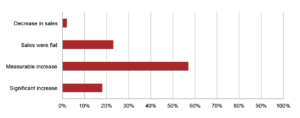
This is quite impressive but we wanted tolook more closely and focus on only the 18% who reported a significant increase in sales. We sought to determine what those companies are doing that is so different from the overall population. We identified that the companies that had customized and formalized their sales process and reported significant increases in sales had these contributing factors:
- 82% had also accounted for the “Buyer Journey” in their sales processes versus 52% of the overall respondents.
- 73% had evaluated their sales forces versus 51% overall
- All of them had ongoing monthly or weekly sales training for at least a year compared with just 28% overall
- Most had hired outside sales training firms to provide the training versus 44% overall
- 85% had a dedicated inbound lead generation team versus 55%
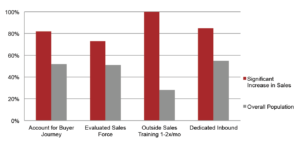
Summary: A customized formal sales process appears to correlate with an increase in sales. However, the significant increase occurred only when companies also evaluated their sales forces, accounted for the buyer journey in their sales processes, had an outside sales training firm provide monthly or bi-weekly sales training for at least a year, and had a dedicated Inbound team generating leads. The sales process appeared not to be the cause, but one of several significant contributing factors.
Does Social Selling Impact Sales Effectiveness?
We asked participants if they were engaged in Social Selling. As you can see in the graph below, nearly 60% answered yes, with nearly 20% telling us that they have formalized social selling initiatives.

We also asked them how Social Selling has contributed to the number of qualified opportunities in their pipelines. Nearly 40% told us that as a result of their Social Selling initiatives, they had more qualified opportunities in their pipelines.
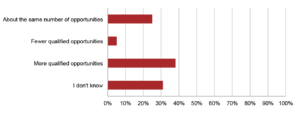
We focused on the 38% of companies that reported more qualified opportunities to discover what they were doing differently. We identified that:
- These companies were much more likely to have more than 25 salespeople and between $25 – $75 million in revenue.
- They were 30% more likely to have a significant increase in sales than the overall
- 50% had quarterly sales training compared with 22% for the overall respondent population
- Social Selling was practiced equally across traditional, inside andlead generation teams. In the overall population, Social Selling was practiced by the traditional sales teams 50% more often than by inside and lead generation teams. We believe that traditional salespeople, aware of Social Selling channels, may be informally dabbling in Social Selling, while inside and lead generation teams pound the phones.
- 85% reached out directly to prospects over Social Selling channels compared with 59% overall.
- Social Selling was of little help to salespeople who routinely maintained a full pipeline. Only 1% experienced an increase in pipeline size. There are two possible explanations for this: It could be that these specific salespeople have not yet adopted Social Selling, or, these salespeople used Social Selling but because they had full pipelines anyway, it was simply an alternate source for opportunities.
- Social Selling did help salespeople who typically had poor pipelines. 20% reported that their salespeople showed significant improvement in pipeline quality compared to 11% overall.
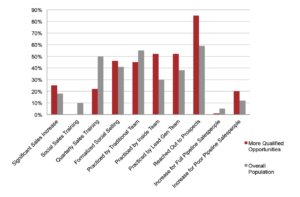
Companies that formalize their implementation of Social Selling more frequently reach out directly to prospects, achieve more qualified opportunities, and achieve significantly more sales.
Next we turned to the companies reporting either no increase or a decrease in qualified opportunities. We found that these companies had the following distinctions:
- 67% had an informal rather than formal approach to Social Selling
- 75% are either just now implementing or have recently implemented Social Selling in the past 12 months
- 75% have their traditional sales team practicing Social Selling
- 75% focus more on LinkedIn Group participation and 66% on Blogging, while only 50% reach out directly to prospects.
Summary: Social Selling appears to have an impact on the size of very few sales pipelines, but the impact on the quality of the new opportunities generated is significant. Social Selling makes a difference and companies that have been slow to adapt are well behind in the race to have a presence, make new connections, identify new prospects, and add new, quality opportunities to their pipelines.
Do Inbound Leads Shorten the Sales Cycle?
Depending on who we listen to, we are told that buyers have completed anywhere from 57% to 70% of their journey (The Buyer’s Journey) by the time a salesperson is engaged with them. That may be true in certain businesses but it does not apply in general and the percentage to which it applies is debatable. We are also told that Inbound Marketing, the art of getting found online and generating leads, is now King. Is that true?
56% of our respondents said that they have utilized Inbound lead generation for at least 2 years. 26% answered that inbound leads convert to conversations with interested prospects 10-20% of the time; but 32% said they convert more than 40% of those leads.
We focused on the 32% of companies that convert more than 40% of their leads and sought to determine what they are doing differently from everyone else. We identified that:
- 88% had shorter sales cycles compared with 47% of the overall respondent
- New salespeople performed better in 83% of these companies compared with 49%
- 83% used the results of their Sales Force Evaluation as a road map that they followed to make appropriate changes and improvements to their sales Compare that with 58% overall.
- These companies hired outside sales training firms 83% of the time compared with 44% overall.
- 100% were trained in traditional sales competencies compared with 55%
- 50% were trained weekly for a year compared with 20% overall
- 100% reported an increase in sales as a result of Inbound compared with 66%
- 74% enjoyed a better win rate as a result of Inbound compared with 47%
- 42% reported a shorter sales cycle as a result of Inbound compared with 34%
- Social Selling is being practiced by the Lead Gen team in 86% of these companies compared with 39% overall.
- 100% are reaching out directly to their prospects compared with 59%
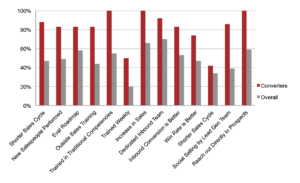
We also we looked athe companies with dedicated Inbound Teams that converted fewer than 21% of their inbound leads toconversations. We sought to learn what the difference was between those with successful Inbound Teams and those with unsuccessful Inbound teams. We identified that:
- New salespeople performed better only 50% of the time compared with 83% at the top performing companies with Inbound Their poorer results are consistent with what most companies report with regard to new salesperson success.
- Only 44% used their sales force evaluation as a road map compared with 83% of the top performing companies with Inbound Teams.
- Only 44% hired an outside sales training firm compared with 83% of the top performing companies with Inbound Teams.
- Only 14% received training weekly compared with 50%, but 43% did receive training monthly.
- Only 56% had an increase in sales compared with 100%.
- All converted their inbound leads to less than 20% of the 43% said their win rates were worse compared to 74%.
Summary: The existence of a formal Inbound Team is not a guarantee that sales results will change. The companies that converted most effectively not only invested in sales training, they trained their salespeople on the most important sales competencies, like consultative selling, listening and questioning, sales process execution, and qualification. In addition, half of them did this as frequently as weekly. As a result, they easily beat the numbers produced by the companies that did not receive training or have it as often, or have the same content. Was their success the result of having a dedicated Inbound Team? Not entirely. The data is clear. The right sales training, conducted frequently, by outside experts, was the big difference-maker for the companies that had invested in dedicated Inbound Sales/Marketing Teams.
Is the Traditional Sales Force Still Relevant?
In order to answer this question, we looked only at those companies whose sales cycles were shortened and whose sales increased as a result of sales process optimization and looked for factors that differentiated those companies from all of the others. We identified that:
- 60% of the respondents were CEO’s compared with 31%
- 90% of the companies had fewer than 25 salespeople compared with 64%
Beyond the demographics, we learned that:
- 100% said they had a formal, structured, optimized sales process compared with 69% overall.
- 80% said they had accounted for the Buyer Journey versus 50%
- 100% had included sales specific candidate assessments in their hiring process versus 79% overall
- 75% of their new salespeople surpassed the results of those hired before them compared with 49% of the overall population.
- 88% used their sales force evaluation results as a road map versus 58% overall
- 100% trained their sales force at least monthly versus 49%
- 100% had a significant increase in sales versus 11%
- 90% have ongoing Inbound lead generation compared with 55%
- 67% had better win rates compared with 46%
- 100% have adopted Social Selling programs compared with 57%
- 100% are participating in LinkedIn Groups compared with 71%
- 50% reported that as a result of Social Selling, they saw a significant increase in pipeline size from those salespeople whose pipelines were typically poor compared with 12% overall.
These findings are significant – especially those with typically poor pipelines having a significant increase as a result of Social Selling. You might recall that we did not see that earlier in the report when we focused only on companies practicing Social Selling. Clearly, the difference here is that these successful companies are implementing best practices across the board; while in the other instance we were focusing on only one of the results of companies that had implemented Social Selling.
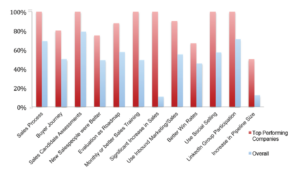
As you can see from the graph, the best practices encompass nearly all areas of a modern sales force. The key is integration and commitment to best practices with both traditional solutions and modern technological tools. From the demographics of this successful group we also determined that CEO’s of small and mid-size companies are more likely to be involved with and drive the decisions and initiatives that lead to the adoption and best practices seen here.
We also compared the results we identified above with those companies whose sales remained flat or had declined. We found that:
- Only 18% of the respondents were CEO’s compared with 60% of the top performing companies and 31% overall.
- 27% of the companies had more than 25 salespeople and 45% had fewer than
Beyond the demographics we found that:
- Only 45% had accounted for the Buyer Journey compared with 80% of the top companies
- 37% had not integrated their sales process into their CRM applications
- 37% had not refined their hiring and selection processes
- 30% do not include sales specific candidate assessments
- Only 14% had new salespeople perform better compared with 75% of the top companies
- Only 40% used the results of their sales force evaluation as a road
- 64% chose not to hire an outside sales training firm
- 75% focused their training on phone and email prospecting, value selling and consultative selling – and most did the training themselves.
- 75% provided training at least monthly or more – but it was far less effective because it was done internally.
- Only 35% have Inbound lead generation taking
- None are converting their leads to conversations any better than 10% of the
- Only 25% are converting their inbound leads to sales any better than 10% of the
- Only 30% have formalized their Social Selling
- 50% of them are recent adopters of Social
- 83% are posting Videos as their approach to Social Selling
- 100% said that Social Selling has not helped those whose pipelines were traditionally poor.
Summary: We can determine that when the CEO is not driving these decisions or the company is small, they may be late in adopting the latest practices and tools, and the implementations may be ineffective. These companies also failed to leverage some of the things they had already done. For example, the top performing companies made tremendous use of their sales force evaluations and sales training. The bottom performing companies tended to do things themselves and ignore much of the information that was provided to them.
Finally, to answer the question at the beginning of this section, traditional sales teams, those with responsibility for the entire sales cycle, are losing ground. Only 11% of the companies that reported an increase in sales have traditional sales teams.
Do Social Selling and/or Inbound Marketing/Selling Impact the Effectiveness of New Salespeople?
In order to answer this question, we focused on the 27% of companies that reported that their new salespeople were performing significantly better than those hired previously. We attempted to learn what they are doing differently in order for their new salespeople to achieve those sales results. We found that:
- 88% achieved an increase in sales from sales process customization and
- 96% successfully integrated their sales process into their CRM
- 100% have refined their sales recruiting
- 85% include sales specific candidate
- 93% employ a formal on boarding program for new
- 72% used the sales force evaluation for improved sales decision-making and changes to their selection criteria.
- 65% have well-established, inbound lead generation taking
- 75% of the Inbound group have a dedicated Inbound
- 67% of the Inbound group reported that inbound leads convert to conversations and sales better than cold calls andtraditional leads do.
- 76% have a Social Selling program in
- 53% of the Social Selling group reported that the qualified opportunities have
Summary: Many of these findings have a profound impact on new salespeople. As we have seen with other findings in this report, it’s not one particular thing and it’s not necessarily the thing you are looking for or assume to be true. In the case of new salespeople, it is very clear that a sales force evaluation leads to better selection criteria, and a sales-specific recruiting process and candidate assessment get the right salespeople selected. A formal onboarding program, sales process integrated into CRM, and an Inbound lead generation team help new salespeople gain immediate pipeline velocity. Finally, Social Selling improves the quality of leads that the Inbound team are able to generate for their new salespeople.

